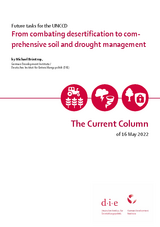Future tasks for the UNCCD
From combating desertification to comprehensive soil and drought management
Brüntrup, MichaelThe Current Column (2022)
Bonn: German Development Institute / Deutsches Institut für Entwicklungspolitik (DIE), The Current Column of 16 May 2022
Bonn, 16 May 2022. The fifteenth Conference of the Parties to the Convention to Combat Desertification (UNCCD) is taking place in Côte d‘Ivoire from 9 to 20 May. The UNCCD, with its Secretariat in Bonn, is far less well known than its two major sister accords, the UN Framework Convention on Climate Change (UNFCCC) and the UN Convention on Biological Diversity (CBD). This is due not least to the fact that the convention was originally focused on the drylands of nations most severely affected by desertification, particularly in Africa. A number of countries in the global North, including Germany, declared themselves “not affected”, viewing the UNCCD primarily from a development perspective. Despite several reforms, the UNCCD had a very modest impact for a long time.
However, fresh momentum has recently been injected into the treaty. One key step was the UN’s decision to make the UNCCD the custodian agency for Sustainable Development Goal (SDG) target 15.3: “By 2030, combat desertification, restore degraded land and soil, including land affected by desertification, drought and floods, and strive to achieve a land degradation-neutral world.” By adopting this target of SDG 15 “Life on land”, the UNCCD was no longer limited to desertification and arid regions and, for the first time, assumed a truly global role. Although this weakened the focus on (African) developing countries, such mission drift also benefited the accord, at least in terms of increased political attention, a vital currency for support.
The next major step for the UNCCD is to improve its work on drought. In order to combat drought and its effects (drought management), it is necessary to tackle the causes, for instance, by making more sustainable use of soil and land and mitigating the impact of climate change. Nonetheless, this is not enough. Drought is a natural phenomenon which cannot be eliminated completely. Further measures will therefore certainly be required in terms of prevention, advance warning systems and response. The goal must be to employ proactive approaches such as integrated water management, crop and income diversification, and open agricultural trading in order to boost the resilience of socio-ecological systems, reduce the need for responsive measures such as disaster assistance, and optimise the system as a whole. Analysis of past droughts and structural vulnerabilities will make it possible to identify and specifically target particular weaknesses. Nonetheless, where droughts are severe, damage is inevitable, with many proactive measures having only a limited effect. Conversely, a number of proactive measures will appear pointless and expensive in the event that there are no droughts. As a result, it is very difficult to analyse costs and benefits and assess the effectiveness of strategies for combating drought. This is the dilemma with all preventive approaches. In addition to preventive measures, responsive measures such as the import and storage of food, the activation of social protection systems, or livestock management could be initiated and costs reduced through the use of early-warning systems. Disaster assistance must be integrated into a sustainable recovery (building back better). In the case of drought, this includes the (re)introduction of adapted varieties of seed and the development of local water infrastructure.
This complex situation poses a real challenge to the UNCCD. The most suitable measures can often only be identified, decided upon and implemented at local level. These include most nature-based solutions. Other measures in areas such as trade and social policy must be initiated at national level, but would need to be adapted in a timely manner to local drought conditions at the given time. When it comes to drought strategies, there is no one single silver bullet. The UNCCD must therefore focus on promoting international awareness, integrated thinking and planning, general guidelines, and local learning.
This requires that drought management be analysed and approached in conjunction with other risks, but still considered as a standalone task (not as part of the climate agenda). Drought management can only be carried out by means of coordination between different sectors, levels and players; no single drought organisation can bear sole responsibility for the process. Nature-based solutions are an especially obvious choice in the UNCCD context (land!) and should be encouraged. And poorer developing countries do indeed require what they have long been requesting, namely greater financial assistance. This support must be provided through the UNCCD and its Global Mechanism (a start-up funding facility), but also as part of the relevant sector strategies of individual countries and development cooperation. Financing should be linked to better governance and results monitoring, which, in the case of combating drought, should be concerned not with observed results, but rather with sustainable implementation of preventive measures and structural development.
If this succeeds, then everyone will benefit, including the global North, from reduced demand for disaster assistance, more stable ecosystems and societies, fewer crises, and less migration. And we already have a great deal more that we can and must learn about drought and soil degradation. It is thus also time for Germany to abandon its self-proclaimed status as a country not affected by the issues in the UNCCD.


